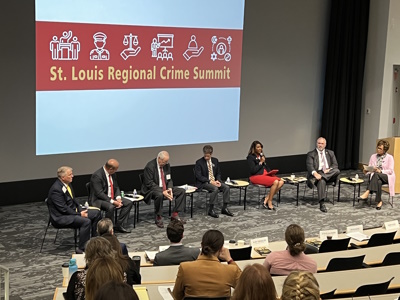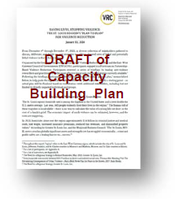 In December 2023, 30 regional leaders from law enforcement, courts, county government, St. Louis City government, and others deeply concerned about violent crime in the St. Louis region met for a four-day “Practicum on Partnership-Based Violence Reduction.”
In December 2023, 30 regional leaders from law enforcement, courts, county government, St. Louis City government, and others deeply concerned about violent crime in the St. Louis region met for a four-day “Practicum on Partnership-Based Violence Reduction.”
The practicum was hosted by East-West Gateway Council of Governments (EWG) and the Center for the Study and Practice of Violence Prevention (VRC) based out of the University of Maryland. It was led by nationally recognized anti-violence researcher and practitioner Thomas Abt, founding director of VRC, and included nine other national leaders in anti-violence reduction research and practice.
Participants studied detailed data on crime in the St. Louis Region and were introduced to key principles and programs on street violence reduction based on research and data. Participants particularly concentrated on methods grounded in focused deterrence and its rapid results in other metro areas committed to reducing homicides and street violence.
In conclusion, the group asked for the rapid development of a regional, unified plan of action to reduce homicides by 20% utilizing the proven anti-violence method of focused deterrence. They gave agency to EWG and VRC to envision a “plan to plan” – essentially a blueprint on how to build needed collaboration, coordination, infrastructure, governance, funding, and accountability for such an initiative to succeed.
In response, EWG and VRC began hosting a small work group consisting of local government leaders, leaders in crime reduction strategy, prosecutors, and police to rapidly draft a plan to build capacity for the initiative. The initial draft of that plan can be found here. It is only a draft. It is the first step in an accelerated regional drive to reduce homicides in our region.

The draft includes an analysis of violence in St. Louis and the hot spots and relatively small number of individuals committing violence. It details the key components of focused deterrence. And, it lists the below key elements needed to build capacity for the initiative to succeed in reducing homicides:
Establishing a highly inclusive Regional Anti-Violence Collaborative that meets quarterly to drive collective action, data collection and dissemination, community and regional buy-in, and neighborhood partnerships and voices.
Establishing a Regional Anti-Violence Council chaired by the mayor of St. Louis and the county executives of St. Louis and St. Clair County that meets quarterly. The council hears reports, oversees and acts on updates from dedicated staff (see bullet point below), and brainstorms solutions. Membership is evenly divided among key stakeholders and includes:
- County executives and/or liaisons
- Senior law enforcement, including chiefs of police, lead prosecutors, and others
- Non-law enforcement leaders and representatives from cross-sector stakeholders (business, nonprofit, education, public health, etc.)
- Citizens, faith based leaders, and others representing high crime areas
Establishing an Anti-Violence Hub based out of East-West Gateway Council of Governments that houses a Regional Implementation Team that guides the day-to-day business and infrastructure of the Focused Deterrence strategy. The Hub coordinates services and support for Focused Deterrence, CBT, and Street Outreach. It arranges meetings and support for both the Task Force and the Collaborative and tracks progress, milestones, data, and outcomes for the initiative.
Learn More:
News: Program to curb murders in the St. Louis area aims to start this fall
News: After crime summit, St. Louis leaders eye collaboration with national expert on crime plan
TEDTalk by Thomas Abt: Why violence clusters in cities – and how to reduce it

